I draw sometimes, and enjoy sharing my opinion about things I love. Currently into: BNHA, Owl House, Miraculous Ladybug, Pokemon, Splatoon, etc. Follow my art account: @h0pe.draws on Instagram
Don't wanna be here? Send us removal request.
Text
Holy shit I just made a brain blast connection.

It's Schrodinger's box.
It's literally that situation. Is the cat dead or alive. Is it dead AND alive?
You'll only know by opening the box. By opening the box you kill the cat. The cat is always dead and alive.
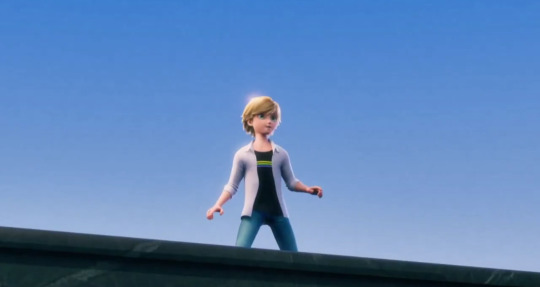
1K notes
·
View notes
Text
Seeing people hate on bnha’s ending for not being a utopia and claiming that nothing about their society has changed, and I just don’t agree with that.
Even if it’s not perfect, their society did change for the better. Crime still exists, but has gone down to the point that less heroes are needed. There’s less idolization on the pro-heroes career - in Deku’s teenage years the ideal job was pro-hero and only pro-hero, but in the epilogue other career tracks such as healthcare and technology are given equal recognition and value to the pro-hero career track. Therapy used to be viewed as a threat and something to be kept hidden because it is shameful to admit that you needed it, and in Toga’s case used outdated practices that did more harm than help - in the epilogue it’s instead seen as something regular and helpful, and that needing help is nothing to be ashamed about, and more up to date and effective at actually helping others, as seen by the therapy programs Uraraka and co created being talked about on tv. Society is shown (I’m mainly thinking about the old granny and the kid) to be less apathetic to those in need. Things have changed for the better.
It’s not a utopia. Crime still exists. Heroes are still needed. But they’re no longer the sole bandage for the gaping wound that used to be their society. Other people from other careers help serves as bandages too, and all of that ultimately helps society function in a way that benefits everyone better. If utopia is the top of the stairs and the society shown in the story’s beginning is at the bottom of the stairs, the society shown in the epilogue is on the step that is halfway up to the top. Not perfect, but improving, and one that is working on continuing their improvement so that they don’t fall stagnant and backslide back to the bottom of the stairs where they used to be.
(Ngl if I want to be more specific it’s that the beginning of the manga has them in the lower parts of the steps solely because All Might and his Symbol of Peace carried them there, but it’ll muddy the metaphor too much lol)
But anyways. BNHA’s ending does something I find much more interesting than ‘they’ve created a crime-free utopia where everyone is happy’. The ending goes ‘things aren’t perfect but they’re improving, and will continue to improve so long as everyone puts in the effort’. It acknowledges imperfections, and the beauty and importance of small steps that lead up to big changes. It promotes gradual growth as important and crucial, and that’s a message I find much more relatable than a crime-free utopia.
187 notes
·
View notes
Text
My Hero Academia Final Thoughts
There's a line that I absolutely adore from the Justice League cartoon. In the episode Hereafter, Superman is believed to be killed and a funeral for him is held. Martian Manhunter, in his speech, concludes with, “Let us all strive to accept his gift and pass it along as an ongoing tribute to Kal-El of Krypton: the immigrant from the stars who taught us all how to be heroes.”
My Hero Academia is coming to an end after around a decade now, and a lot of discussion is happening around the ending, and what has and has not happened. The world of My Hero Academia is one that is shown to be deeply flawed and at points outright cruel. Discrimination runs rampant through all levels of society, and the populace is plagued with a general sense of apathy. People are not inspired to act, but to be passive. Why bother putting in the effort to help others when you can wait for a Hero to do it?
All Men Are Not Created Equal.
This line from the start of the series has been used in many discussions of My Hero Academia over the years especially in regard to the themes of discrimination, but this final chapter provides a new interpretation of them. It is because people are different that we seek each other out. Humans are, after all, social creatures. We simply cannot survive alone. This has been true for thousands of years.
My Hero Academia is a story about justice. Many people wanted the entire government torn the ground, burned, and replaced. But who would that help? How many people would die from that because they needed financial or medical aid that the government supplies? How would a new government even be formed that way? That is the truth Shigaraki’s righteous destruction. It would solve nothing. Cathartic, perhaps, but it would leave a scarred world that may never actually recover.
My Hero Academia is a story about helping people. It is a story about refusing to engage in dehumanization. It is a story about empathizing with others and reaching out to help them. And it is in that act that heroism is performed.
The world presented in the final chapter of My Hero Academia is not perfect.
But it’s better. And it’s still improving.
Shoji has worked to further decrease discrimination.
Uraraka is providing resources for people whose Quirks might cause issues for themselves and others.
The final thesis of My Hero Academia is not about superheroes or an empowered police force. It is that the word ‘hero’ applies to anyone who wants to make a positive change. Heroes are people who help others in need. Heroes like that old woman who helped the boy from the previous chapter, or the middle schooler that tried to help the child who tripped.
There’s a reason that the final scene of the manga is Class 1-A responding together to a natural disaster and not to a Villain attack.
Heroes are a function of Community Outreach.
Midoriya’s legacy is not what he did with One For All. It is that he stood in front of a Japan—a world—struck by apathy and indifference and said “This is wrong!” Midoriya’s legacy is holding his hand out to help others. Midorya’s legacy is that he inspired others to do the same, to throw off their apathy and apply themselves to others.
Let us all strive to accept his gift and pass it along as an ongoing tribute to Midoriya Izuku: the Quirkless man who taught us all how to be heroes.
#Bnha#mha#boku no hero academia#my hero academia#bnha spoilers#midoriya izuku#izuku midoriya#bnha analysis
157 notes
·
View notes
Text
Just gonna put this tiktok here in case anyone needs further clarifications cus im going crazy with these takes being all over my feed
A Reminder about MHA’s last chapter
Dear MHA fandom, the leaks never said that Class-A lose complete contact with Izuku for the last 6 years, only that they haven’t been able to see eachother because of scheduling conflicts. TEXTING, CALLING, AND VIDEO-CHATTING ARE STILL A THING. FOR ALL WE KNOW THEY’VE BEEN TEXTING 24/7 SO PLEASE STOP REACHING SUCH AN INSANE CONCLUSION WHEN THATS LITERALLY NOT THE CASE.
Translations say they “haven’t had enough time to get together”, which means seeing each other in person. It doesn’t mean anything about other forms of communications. Long-distance relationships happen all the time. Dont you remember still keeping in touch with others after moving away or after highschool/college? It’s the same case here.
So, let’s all take a deep breath, no matter who you ship or care about most, and remember that these kids all care about eachother and nothing can change that.
#Bnha#mha#my hero academia#boku no hero academia#bnha deku#midoriya izuku#bnha spoilers#izuku midoriya#bnha meta#bnha analysis#deku#bnha manga spoilers#bnha 430#mha 430#bnha 430 spoilers#class 1a#bnha class 1a#mha class 1a
787 notes
·
View notes
Text
A Reminder about MHA’s last chapter
Dear MHA fandom, the leaks never said that Class-A lose complete contact with Izuku for the last 6 years, only that they haven’t been able to see eachother because of scheduling conflicts. TEXTING, CALLING, AND VIDEO-CHATTING ARE STILL A THING. FOR ALL WE KNOW THEY’VE BEEN TEXTING 24/7 SO PLEASE STOP REACHING SUCH AN INSANE CONCLUSION WHEN THATS LITERALLY NOT THE CASE.
Translations say they “haven’t had enough time to get together”, which means seeing each other in person. It doesn’t mean anything about other forms of communications. Long-distance relationships happen all the time. Dont you remember still keeping in touch with others after moving away or after highschool/college? It’s the same case here.
So, let’s all take a deep breath, no matter who you ship or care about most, and remember that these kids all care about eachother and nothing can change that.
#bnha deku#bnha#midoriya izuku#bnha spoilers#izuku midoriya#my hero academia#boku no hero academia#mha#bnha meta#bnha analysis#deku#bnha manga spoilers#bnha 430#mha 430#bnha 430 spoilers#class 1a#bnha class 1a#mha class 1a#bakugo katsuki#bakugou katsuki#urakara ochako#ochako urakara#shoto todoroki#shouto todoroki#tenya iida#iida tenya#kirishima eijirou#eijirou kirishima#Deku#izuocha
787 notes
·
View notes
Text
Rebooting this cus yall need to realize that Izuku was ALWAYS meant to permanently lose OFA and become quirkless again in the end because it wraps up his arc of self-acceptance and being comfortable in his ability to make a difference on the world without him without powers (aka as himself).
Izuku Midoriya and confronting a complicated past— an analysis
With the upcoming arc in the anime about to come after next week’s episode, I think that it’s important to talk about Izuku as a character, and everything that has led him to this moment and this particular arc in the series. While there is a lot going on in that Kid’s head, most of the things that directly cause Deku to act the way he does during his vigilante time has been left unsaid and up to the reader to pick up on. This could be seen as sloppy writing, but it could also be seen as a great use of subtlety to create a slow downward spiral for our protagonist that can be incredibly rewarding for readers who take the time to do some extra sleuthing. So before the arc begins, and before the inevitable controversy on whether or not the arc was rushed or came out of nowhere, how about we take a close look at Izuku Midoriya as a character and his depth that is often ignored. Let’s take a peek at how his entire arc is filled with tragedy, hope, and the importance of confronting one’s past. Sit back, grab a snack, and enjoy my first in depth BNHA analysis where I hope to give manga readers who are currently watching the anime some added perspective. Also disclaimer: I love all the characters in this series and will not be bashing on any of them, as I feel as though it would be undermining the messages of the story and the depth of the characters. Nothing I say is meant to be putting down any characters and I am not blaming any single character for Izuku’s struggles. All fans of any characters are safe and welcome to enjoy this.
At the beginning of the series during the very first line from our protagonist, which is something that is supposed to help the audience understand the type of story they are about to read— Izuku says “people are not born equal”. He also states that he learned that fact at the young age of four years old. From the very beginning, Deku was made to believe that he is less than everyone else. Less than those with quirks, and therefore less of a human. Quirks, literally translated from Japanese, mean individuality. To be quirkless, in the eyes of MHA’s society, is to be without a soul. Or at least, that is what can be understood by a small child who simply wants to belong. Therefore, deku internalizes form a young age that he inherently has less value as a quirkless boy, and such internalizing severely damages his perception of himself for the rest of the series. He’s a useless deku that does not have much to contribute. However, during the very same first scene we also see Izuku fighting back against the kids trying to beat him up. Despite the odds stacked against him, Izuku midoriya is determined to prove himself. He’s determined to prove to others, and to himself, that he has value. He is also determined to keep moving forward despite society seemingly turning him away. But children need time to process their emotions. They need time to learn and talk through the issues they’re facing. Izuku does not do that. He keeps fighting, he keeps wanting to be a hero, but he doesn’t talk to any adult around him about how he feels. He doesn’t get told that he is perfect the way he is, or that he doesn’t have to prove anything. What happens when such insecurities and trauma are not given the space to heal at an early age? Well let’s move forward a few years…
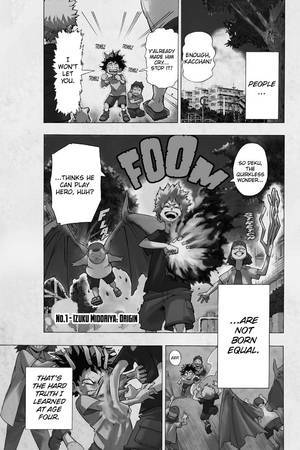
When Deku meets all might, and demonstrates his innate and pure heroism when he runs to save Bakugo from the sludge villain, he is offered a once an a lifetime chance: One For All. He is told that he can become a hero, and is aided in training to use the quirk and get into UA. By this point, Izuku’s self esteem issues that stemmed from his childhood and the the perception of quirklessness that was placed upon him by the world around him have only grown. He wants to be a hero, but he also has become quiet and reserved, as he thinks of himself more as an afterthought. He wants to help people, because he cares and he is a kind hearted individual, but also because he want to be useful. He has to be a useful hero, but how? The quirk of One For All thus represents a way to be useful in the way that Izuku thinks is correct, which is by being a quirked individual. So what happens when you give a kid with extreme self esteem issues, and who views himself as flawed for simply being himself, a very powerful quirk along side the opportunity to become a hero? That child latched onto the quirk like a lifeline. They have to make good use of their new quirk; they have to utilize the blessing granted to them or else they will remain useless and will be left behind. Izuku will work hard to earn his quirk because he feels as though he is unworthy, even though he already proved himself the second that his body moved on its own. Therefore, the second Izuku is given his quirk, he begins the cycle of using it as an unhealthy coping mechanism and source of validation. He is more hopeful than ever when given the quirk, but his unhealthy mindset is also given the power to run rampant. This is the story of a boy becoming the greatest hero he says, so early on in the series, but it also of a boy desperately trying to become more than he currently is, for better and for worse.
This then leads to the beginning of his time at UA, where Izuku, in addition to clinging onto his quirk as a replacement for his self esteem, begins reclaiming the meaning of his nickname Deku. “Deku is the name of a hero” he declares, and while taking back the power from his former bully and standing up for himself is an incredibly uplifting moment or Izuku in the beginning of the manga, there is another side of the coin that is the reclamation of Deku. Izuku Midoriya feels as though he has to be the new, hero Deku, or else there is nothing else worthwhile about him. He has to prove himself as a true hero or else he’ll have to go back to the old, useless Deku…He’ll forever be left behind. So, he breaks himself. Over, and over, and over again. The hero named Deku breaks his limbs time and time again, because if he doesn’t push himself to the brink, then he hasn’t done enough, and therefore he has failed the quirk that he was blessed with and failed the people who have helped him. The sentiment that he needs to hurt himself, or even nearly get himself killed, is incredibly concerning and could even be seen as suicidal ideology. Furthermore, this ideology creates an intense fear that follows Izuku wherever he goes, and even causes him to blame himself in scenarios where it’s not his fault at all, such as the summer camp arc where he was nearly killed by muscular, yet still beats himself up over Bakugo’s capture.
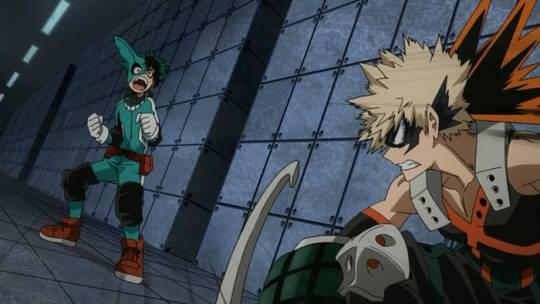
Another development that occurs at the beginning of Izuku’s time at UA is the start of an insurmountable amount of pressure being placed on his shoulders. When Izuku first received One For All, he was told that he could use the quirk to achieve his dreams of being a hero. He knew nothing of its past, and was given no indication that he had to live up to it. Yet, during the tournament arc Allmight begins mentioning the idea of Izuku becoming the next symbol of peace. While an honor to have, being the number one hero and an international symbol was not what Izuku, a fourteen year old kid at the time of the sludge villian attack, signed up for. Yet, he takes on the responsibility with a nervous smile on his face, and the shadow of all might begins following him. Next, he learned about the horrifying figure that is All For One, and Izuku is told that he may have to fight him one day; He may have to fight someone that he had previously thought to be nothing more than an urban legend. The child who wanted to become a hero now has to be prepared to fight the demon lord. Moreover, these revelations begin the process of Izuku placing more and more pressure on himself to be the best hero possible. He cannot afford to make a mistake. He cannot afford to be useless, because the legacy of One For All demands that he be exceptional. Afterall, he’s the ninth user. Do the wants of Izuku Midoriya really matter more than the fate of the world?
During all of this, Izuku slowly becomes more comfortable with his quirk, and grows in confidence. He truly becomes equals with Bakugo and works with him to mend their relationship, and he also develops his shoot style in an effort to move away from imitating All might. These things are all possible development for Izuku’s character and also gradually take place as the series goes on. After so many years of being quiet, he finally opens himself up again; He opens himself up to love from his peers, and opens himself up to new experiences. He also becomes more willing to talk back to others, as demonstrated by his attitude towards Endeavor, and later his more frequent and friendly banter with Bakugo. However, the self esteem issues and insecurities never go away, and Deku still breaks himself every chance he gets. The pressure also still continues to build as Allmight retires, and Izuku becomes truly trapped in his role as the successor. He accepts his role, and is happy to be serving others, but Allmight’s retirement leaves a void that Izuku feels as though there is no one else left to fill but himself. There’s no backing out now, and Izuku’s quirk development now has to speed up or else he will never be able to fill that void. He also witnesses the might of All For One in person, and the nightmare of him having to face the demon lord becomes even more of a reality. Through all of this, Izuku still refuses to talk about his feelings with his peers or the adults around him, and instead he decides to keep marching forward without taking any time to let himself, or his mind, rest. The only sliver of hope for Izuku’s mental well-being is the fact that he still allows himself to cry. Therefore, the shadow of responsibility that followed Izuku morphs into a massive weight on his shoulders that helps to steer his development backwards and into character regression.
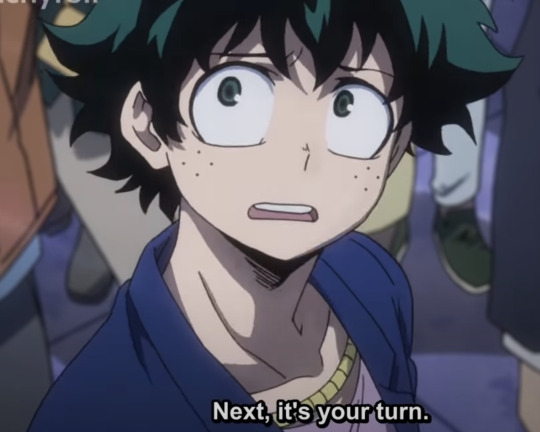
Izuku’s mental health then takes a turn for the worst after the Overhaul arc, which was also a turning point for the series with its dark tone. As Izuku sees for himself the real horrors of the criminal underground, he once again blames himself for Eri’s circumstances and his inability to save someone. Through this experience, Izuku becomes so entrenched in the idea of becoming the perfect hero that he even begins denying himself the right to cry. He says that “heroes don’t cry”, and other characters such as Todoroki are shocked at the statement by their friend. Crying was one of Deku’s last healthy coping mechanisms, and he loses that too. Nighteye’s death cements this fact, as it is actually the last time that Deku sincerely cries in series, before the end of vigilante arc. All other times that he cries moving forward form this point are played off as gags, and thus Izuku represses his emotions to an extent that is even foreign to him, as someone who has been suppressing his emotions since he was a small child. It should also be noted that this arc highlight’s Deku’s uncertainty as a holder of One For All. This shows that no matter how much Deku’s confidence improves, he will continuously view himself as not good enough and fear the return of the former “useless” Deku. In addition, the overhaul arc also highlights Izuku’s loss of innocence. As I said before, Izuku is exposed to the true cruelties & horrors of the villian underground, but this development is not new. Dating back to the Stain arc, Izuku has been gradually losing more and more of his innocence. Even when he endured a very difficult childhood, Deku was at least able to told onto hope and be optimistic for the future, but being thrusted into the world of heroes takes the bright eyes boy and chips away at his soul. He keeps going, because as always he refuses to give himself time to heal, but the Izuku at the end of the Overhaul arc is not the same person as we was when he first enrolled in UA, and he never will be again. The fear, responsibility, and loss of innocence all culminate to send the mental health of Izuku Midoriya into a free fall, but he would never admit it. Instead, he keeps on smiling.
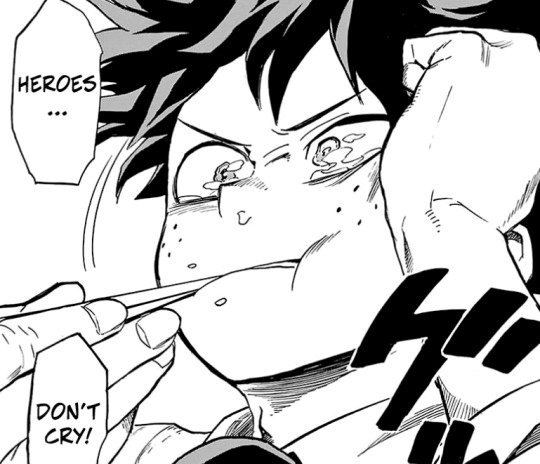
We are getting close to the vigilante arc (I hope you’ve been enjoying this so far!), but one final significant development in Izuku’s mental state occurs during the Class 1-A and Class 2-A training session, where he is once again given responsibilities that he never asked for. At this point, Izuku’s confidence has grown exponentially, but on further inspection much of that confidence seems to be misplaced. You see, while Izuku becomes extremely confident in his use of One For All, he still remains insecure about himself as an individual. He still lives in fear of being useless, and constantly needs to prove himself. This is because Izuku Midoriya the individual is being slowly left behind, while the Deku the hero becomes comfortable with his quirk because if he can’t master his quirk then he has nothing. He is nothing… Then Blackwhip appears, and Izuku has to relearn his quirk even though he had already been working fro months to get to to the place he’s currently at. It feels like a slap to the face, but now that Izuku has now more formally met the vestiges, he’s given no choice but to accept his new quirks in addition to his role in “completing One For All,” as The 1st user puts it. Izuku Midoriya fades even more, the incredible amount of responsibility grows even more, and the hero Deku sees himself as nothing else but the ninth holder. Most of this understanding of Izuku’s mental state is not actually spoken of out loud in the manga/anime, but the context clues of the events leading up to this moment (as shown by all the writing before this), Izuku’s facial expressions, and the events afterward help strip away the smile that Izuku is so determined to keep on his face almost the entire arc and show high Izuku’s walls have grown around his internal anguish. Therefore, the metaphorical vault shown that Izuku uses to lock away his quirks is also used to lock away his emotions once and for all. The only leak in this facade that we have until the end of the vigilante arc is…
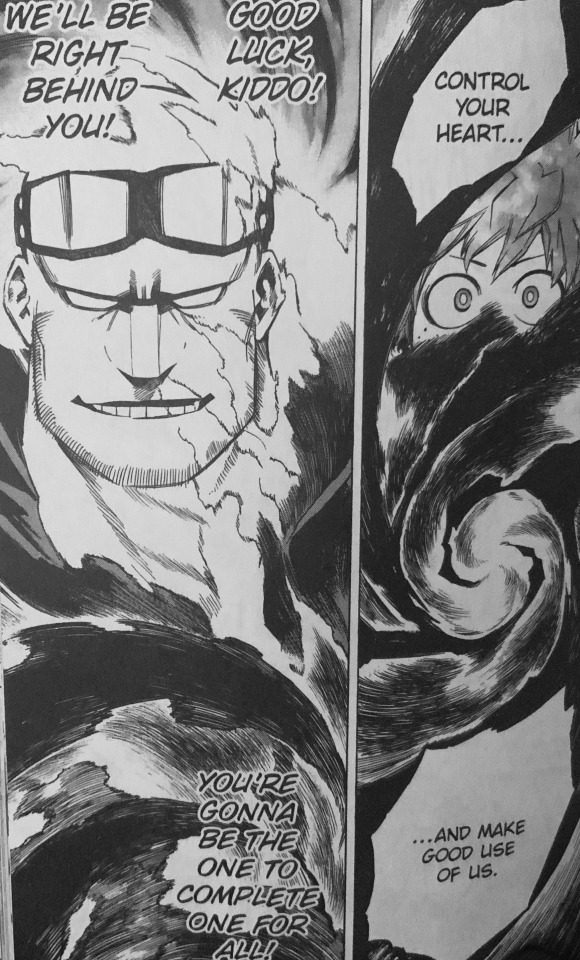
Izuku’s character regression has already been set in stone by the time the war arc comes around, but what is important to note is how his repressed emotions manifest in the form of his intense rage. We’ve seen this before, with how Izuku becomes incredibly intimidating and unhinged during his fights with villains such as Muscular and Stain. All For One’s theme even plays in the anime as Izuku fights Overhaul to represent how monstrous he is int eh eyes of villains during battle. The difference during this arc is that other characters are finally catching on to just how toxic Izuku’s ideology has become. Bakugo in particular takes takes note of just how not ok it is for Izuku to not take himself into account, and shows visible concern while Izuku fights with Shigaraki in the air. Not only is Izuku being destructive to himself, but he also lashes out so harshly that is seems though he intends to kill Shigaraki in the moment. But to Izuku, he has no other choice. He is Deku, a hero, and the Deku who always does his best. Deku himself veery clearly states during this arc that he will no longer be the useless deku, and with that statement he resolves to kill the remnants of Izuku Midoriya, the quirkiness kid with bright eyes, himself. He cannot afford to be useless. He refuses. He will kill himself during this fight with Shigaraki if that’s what it takes to be a hero who saves everyone and a hero who is worthy of being the ninth holder of one for all. Finally, everything has come full circle, and the name Deku starts as something negative, then is given hope to become something positive, but then once again becomes a toxic image within Izuku’s life. That is why it is so important when Izuku is called by his first name in the vigilante arc— because Izuku Midoriya, both the quirkiness child and the current person, are deserving of love and have value beyond their quirk. Izuku is more than One For All, but unfortunately all of his repressed emotions that have been highlighted throughout this entire analysis have to explode out of him in order for him to heal. In addition, Deku and the repression of his emotions has led him to push everyone else away, even back when he was smiling nonstop. The war arc simply showcases ho bad that seclusion has gotten, and that when it comes down to it Deku will purposely exclude his peers in order to suffer alone.
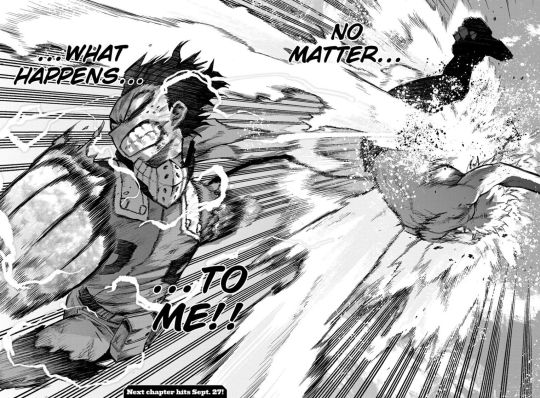
Izuku, in the vigilante arc, will simply be the ninth holder of One For All, whose only purpose and value lies in defeating All For One himself. Furthermore, at the center of this entire discussion, is the fact that Izuku is afraid of his past. All of his self esteem issues come from such a young age, and yet he does not know what else to do besides run from it. Izuku Midoriya is a character that is so defined by his past, yet is so desperate to escape it. Therefore, he will need to be reminded by his loved ones that the cycle of trauma that he has endured throughout his life does not have to continue. He can choose his own way. He is not shackled by his past, and thus healing is possible. It’s not too late, and all he needs is his friends to remind him of why he is loved for his heart, and not his quirk. Therefore there is no singular character that got through to Deku. All of 1-A saved the boy who was so desperate to save anyone but himself.
With that said…
Deku’s entire arc throughout the series leading up to the vigilante arc has been filled with regression, in the sense that the heros around him place more and more pressure on him to the point that he does not consider himself human, but rather a tool that has no value outside of One For All. This is the story of a boy that becomes the greatest hero, but also of a boy that was stripped of his innocence and beaten down by a system that rejected him since the beginning, yet he still dreamed of being a part of. The entire vigilante/villain hunt arc brings together all of the pent up pain and self-loathing that has been following him since the beginning of the series, and shows how everything that he’s been hiding has finally caught up to him. The pain and trauma that we see from Izuku in this arc was always there, and all it took was the war arc to trigger it to come forward. In conclusion, Izuku Midoriya is an extremely complicated character who has been on a fascinating downward spiral since the beginning of the series, and if readers can take the time to see how he got to where he is, then maybe we can at least better understand the context behind the vigilante/villain hunt arc, and the complexity behind My Hero Academia’s protagonist.
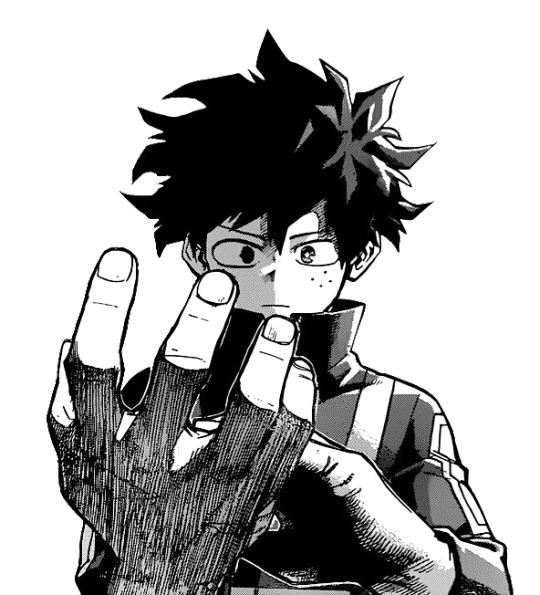
Credit to @mettywiththenotes for having the post that inspired this essay, and that I originally had the conclusion of this analysis posted under as a reblog. Also credit to @pikahlua’s mha discord server that I’m in for encouraging me to write this!!!
#Bnha#mha#bnha meta#mha meta#bnha spoilers#bnha 430#midoriya izuku#izuku midoriya#deku#bnha deku#boku no hero academia#my hero academia#Mha 430#bnha 430 spoilers
372 notes
·
View notes
Text
The Powerful Theme Behind BNHA’s Nuanced Ending
As I’m posting this we only have one more chapter of the manga and I don’t know how the ending is going to exactly play out, but I do know one thing. The deaths of Toga and Tenko were not in vain, and the author is still trying to give readers hope while also still maintaining some realism and bitter-sweetness in his messaging. Therefore, this is what I think Horikoshi is trying to tell his readers, especially the young people who have their whole lives ahead of them to make a difference on the world:
I see how this theme, the one that’s been built up throughout this manga yet simultaneously feels like it’s coming out of left field, is one of those themes that is a hard pill to swallow. Basically, no matter how hard we can try and push to do good and help others/make the world a better place, we’ll often fail again and again. A lot of bad things can happen, society can choose to remain apathetic, and it can seem like nothing’s ever gonna change because you just put all that hard work in towards the future for nothing. However, even if sometimes you can’t save everyone or society keeps trying to push issues under the rug, that doesn’t mean we should give up trying to fight for social issues we care about. We might never get to see the perfect world Deku and Urarak dream of, and Tenko and Toga may be gone, but their fight for a good and accepting world will someday be worth it cus their actions do have weight by showing that redemption is possible, even if no one has seen it except them. Young people like them just have to make sure to leave their mark so that others can follow.
My Hero Academia is about how we all can become the greatest hero, not by magically destroying the world’s problems and apathy overnight, but instead by continously reaching out a helping hand to people who might not initially seem like they want it.
#Bnha#Bnha meta#mha meta#mha#boku no hero academia#my hero academia#bnha spoilers#bnha analysis#class 1a#mha deku#mha ochaco#mha analysis#bnha deku#bnha ochaco#deku#uraraka ochako#ochako uraraka#izuku midoriya#midoriya izuku#shigaraki tomura#tomura shiragaki#toga himiko#himiko toga#tenko shimura#shimura tenko#shigaraki#toga#mha shigaraki#bnha shigaraki#mha toga
271 notes
·
View notes
Text

@wackus-bonkus-maximus ‘s fic One Does Not Love Breathing is legit one of the best works of writing I have eve read and I felt so inspired by it I had made a movie poster for it! I would give anything to see this fic animated, but for now let’s enjoy how amazing each of them are! Again, I highly recommend checking gout this fic if you haven't already!!!! P.S I tried my best to be as accurate as possible with designs for Catwalker, Volpina, and Ladybug but O did take some creative liberties for the rest of the characters! I hope they fit still fit your vision @wackus-bonkus-maximus !
Below are closeups of the poster:



#mirculous ladybug#cat walker#adrien agreste#chat noir#miraculous au#ladybug#ladybug au#miraculous chloe#miraculous luka#miraculous kagami#miraculous alya#miraculous nino#miraculous zoe#alya cesaire#luka couffaine#chloe bourgeois#nino lahiffe#zoe bourgeois#kagami tsurugi#marinette dupain cheng#adrinette#ladynoir#waxillium ladrian#marichat#miraculous fanart#miraculous art#ml art#ml fanart#ml au#lila rossi
153 notes
·
View notes
Text
I love Deku so much. Today I randomly remembered the early days of the sport’s festival arc when his solution to win the race was to sit on a piece of metal and blow himself up all the way to the finish line. He insane and I adore him. MC of all times.
560 notes
·
View notes
Text
i think deku's never given enough credit for how much crazier he is than katsuki. like... if we're looking at them surface level izuku's the more well-adjusted, liked, sociable one but whenever Shit He Cant Process Well happens, he always rushes in, no plan, all teeth and grit, out here growling and drooling like an honest to god rabid wild animal to the point where his own quirk restrains him or goes haywire (blackwhip). katsuki always looks lowkey scared when he sees deku's crazy eyes, like holy shit, hes gonna get himself killed. while katsuki on the other hand, has always been calm and collected in stressful situations, despite pretending otherwise. he always has a tight rein on himself and his emotions, so every action is purposeful, especially in the latter part of the manga and this parallel between them kills ms
12K notes
·
View notes
Text
seeing all the mha bloggers suddenly rise from the dead just as bkg does
83 notes
·
View notes
Text
I better see someone make fanart of Bakugo and spring trap together because now they’re in the same boat of refusing to die even if logically their death’s should’ve been fatal-
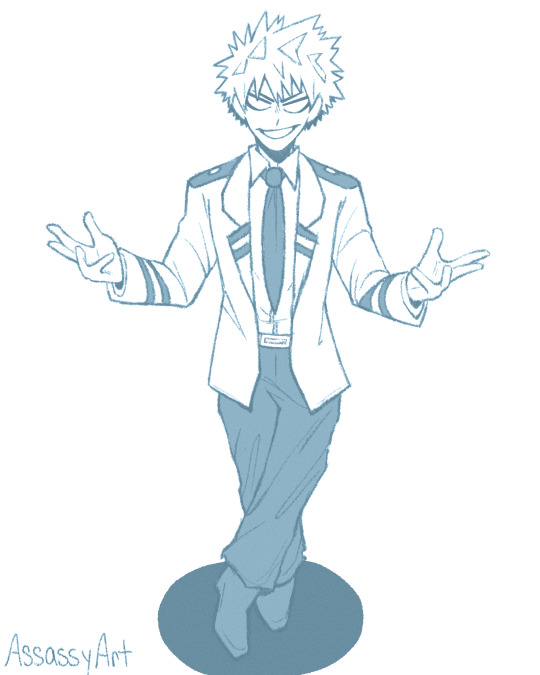
*william afton voice* i always come back
1K notes
·
View notes
Note
📢 AFTER FOUR HUNDRED AND THIRTY FOUR DAYS BAKUGO KATSUKI RETURNS
And he shows up like a king.
366 notes
·
View notes
Text

Ngl I don’t think anybody was hoping anymore
739 notes
·
View notes
Text
Day 3,390:
@is-bakugou-alive-yet
Us rn: ♪(*^^)o∀*∀o(^^*)♪
137 notes
·
View notes
Text
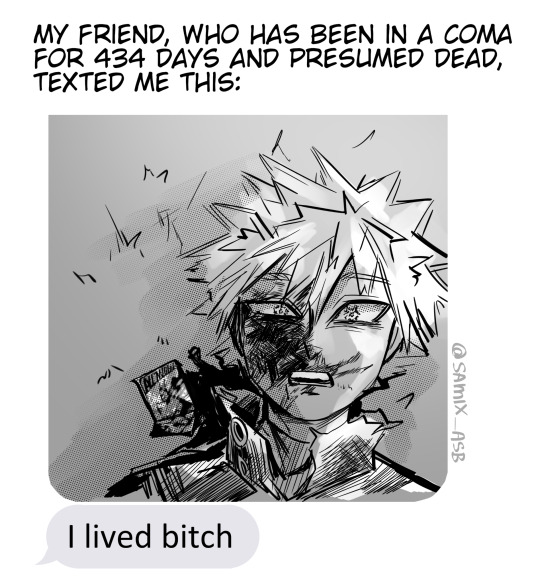
@is-bakugou-alive-yet drew this thinking of you 🩷
5K notes
·
View notes
